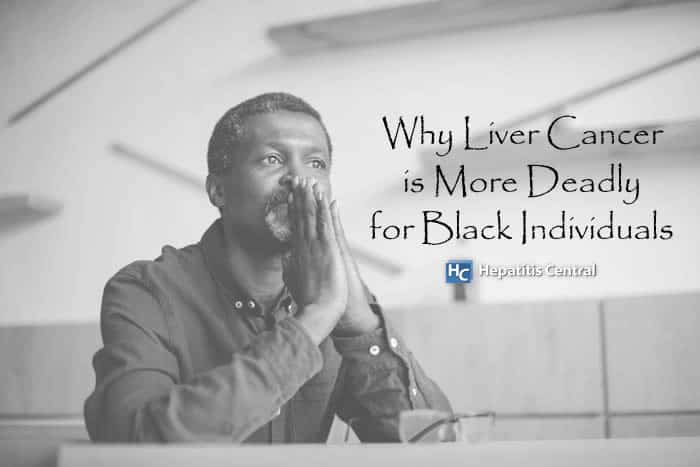Why Liver Cancer is More Deadly for Black Individuals


Chronic liver disease is one of the leading causes of deaths for Black patients, with 60% of men and 40% of women more likely to have liver cancer than non-Hispanic white men and women. (1) According to recent research (2), Black individuals who have hepatitis C often develop an aggressive liver cancer earlier than individuals in other racial groups. Despite being an aggressive cancer, it’s not easy to catch due to the current screening guidelines.
Detecting Liver Cancer
According to the American Cancer Society (3), early liver cancer detection can be difficult since symptoms may not occur until the cancer is in the late stages. Individuals who have liver cancer tend to have cirrhosis or scar tissue from liver damage. If conditions of those patients get worse, that would prompt a doctor to set up a test for liver cancer.
Testing for liver cancer with blood tests and ultrasounds is recommended every 6 months in people who are high risk due to: (3)
- Cirrhosis
- Hereditary hemochromatosis (when your body absorbs too much iron from your diet)
- Chronic hepatitis B infection (even without cirrhosis)
The CDC (4) states that with liver cancer on the rise, individuals should be getting tested for hepatitis C.
Stats show that from 2006 to 2015:
- Incidence of liver cancer increased by 32%
- Deaths from liver cancer increased by 25%
Getting tested for hepatitis is crucial because 78% of Hepatocellular carcinoma, the most common form of liver cancer, is due to chronic hepatitis B or hepatitis C infection. The kicker is that in 2016, 66% of people infected with hepatitis B and 44% of people infected with hepatitis C were not aware of their infection.
The Reason Why
Researchers have noticed that liver cancer in Black people doesn’t cause damage and scarring very quickly, even though it’s typically more advanced. The current guidelines for liver cancer screening states that tests be done only after scarring (cirrhosis) is known. (2)
A Study Published in Cancer

A February study published in Cancer reviewed medical records of around 1,200 people (390 being Black) with hepatitis C and liver cancer who were treated at Mount Sinai Medical Center. It was found that when liver cancer was diagnosed, Black individuals with hepatitis C had little to no scarring but had larger and more aggressive liver cancers. If the typical guidelines were followed (where liver screenings were only done in the presence of cirrhosis), about 1/3 of Black patients in the study would not have qualified. (2)
Dr. Umut Sarpel, the study author, said in an interview with HealthDay (2), “not only is the cancer more aggressive, but we are also not picking it up at the same point in time as we do for other populations. Providers in this arena say that until you develop cirrhosis, you’re fine, but this study tells us that is not really true for everyone.”
There are still lots of unknowns and questions that need to be answered as to why this is the case. “We don’t know whether there is something inherent to these liver cancers that make them more aggressive, or if the data are reflective of higher rates of other comorbidities such as diabetes in this population of patients, or whether these results reflect barriers to accessing health care,” comments Dr. Mark Yarchoan, an assistant professor of medical oncology, in the same interview.
In the end, Sarpel recommends that the guidelines should be updated so that liver cancer can be spotted earlier. “If you are Black and have hepatitis C, let’s not wait for cirrhosis to screen for liver cancer,” she says.
Survival Rate Also Decreases
Unfortunately, Black people with hepatocellular carcinoma (HCC) have lowered survival rates compared to White, Asian, or Latino individuals. A 2020 systematic review and meta-analysis published in Clinical Gastroenterology and Hepatology (5) looked through 35 studies that included 563,097 people with HCC.
The group included:
- 53% White individuals
- 17% Black individuals
- 18% Latino individuals
- 5% Asian individuals
When compared amongst each other, Black people had poorer liver cancer survival compared to White, Asian, and Latino individuals. The reason behind this is similar to what we already discussed – Black individuals had a lower chance of getting their cancer detected at an early and treatable stage. The researchers state that, “interventions are needed to reduce disparities in early HCC detection to improve HCC prognosis.”
Conclusion
Black people are at higher risk of dying from liver cancer compared to White, Asian, and Latino individuals. If you are at risk of hepatitis infections, especially as a Black individual, you should set up an appointment with your doctor to ensure that testing is done even without the presence of cirrhosis.
- Office of minority health. (n.d.). Retrieved March 14, 2021, from https://minorityhealth.hhs.gov/omh/browse.aspx?lvl=4&lvlid=17
- Mann, D. (2021, February 25). Why is liver cancer more lethal for black patients? Retrieved March 14, 2021, from https://consumer.healthday.com/2-25-why-is-liver-cancer-far-more-lethal-for-black-patients-2650611868.html
- Can liver cancer be found early? (n.d.). Retrieved March 14, 2021, from https://www.cancer.org/cancer/liver-cancer/detection-diagnosis-staging/detection.html
- A call for action: Responding to the increasing incidence of liver cancer in the United States. (n.d.). Retrieved March 14, 2021, from https://blogs.cdc.gov/cancer/2019/05/09/a-call-for-action-responding-to-the-increasing-incidence-of-liver-cancer-in-the-united-states/
- Rich, N. E., Carr, C., Yopp, A. C., Marrero, J. A., & Singal, A. G. (2020). Racial and ethnic disparities in survival among patients With hepatocellular carcinoma in the United states: A systematic review and meta-analysis.Clinical Gastroenterology and Hepatology. doi:10.1016/j.cgh.2020.12.029







